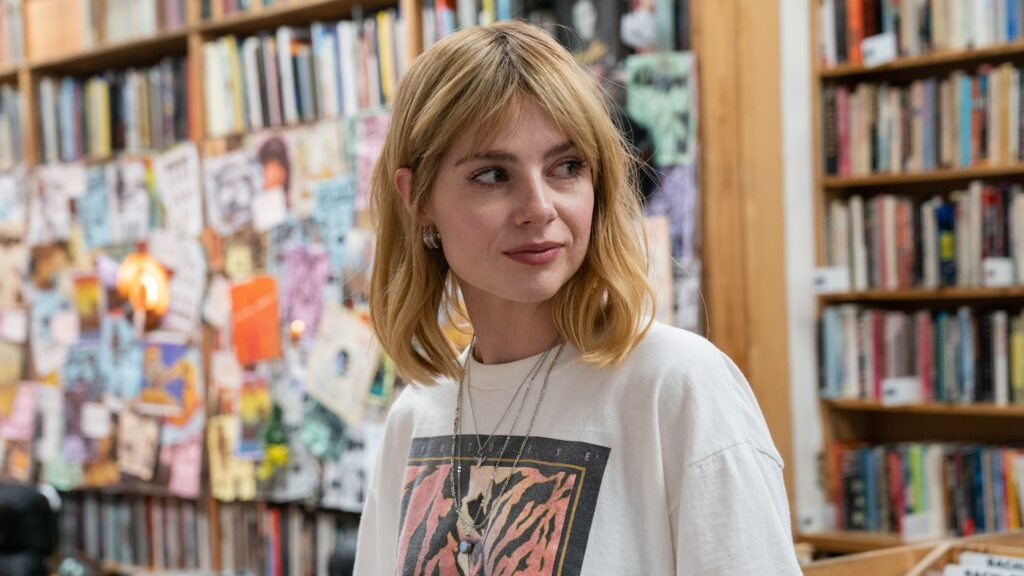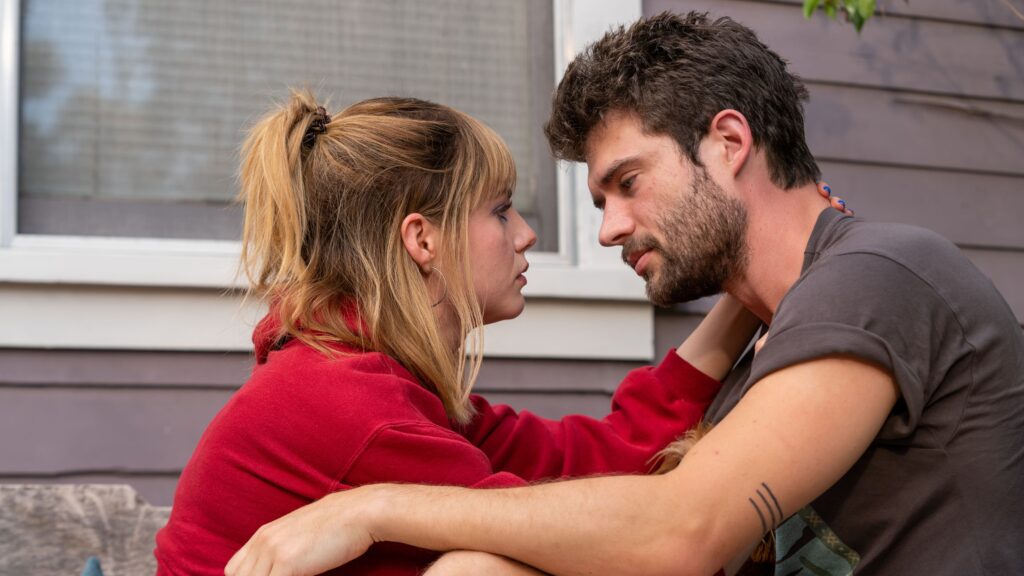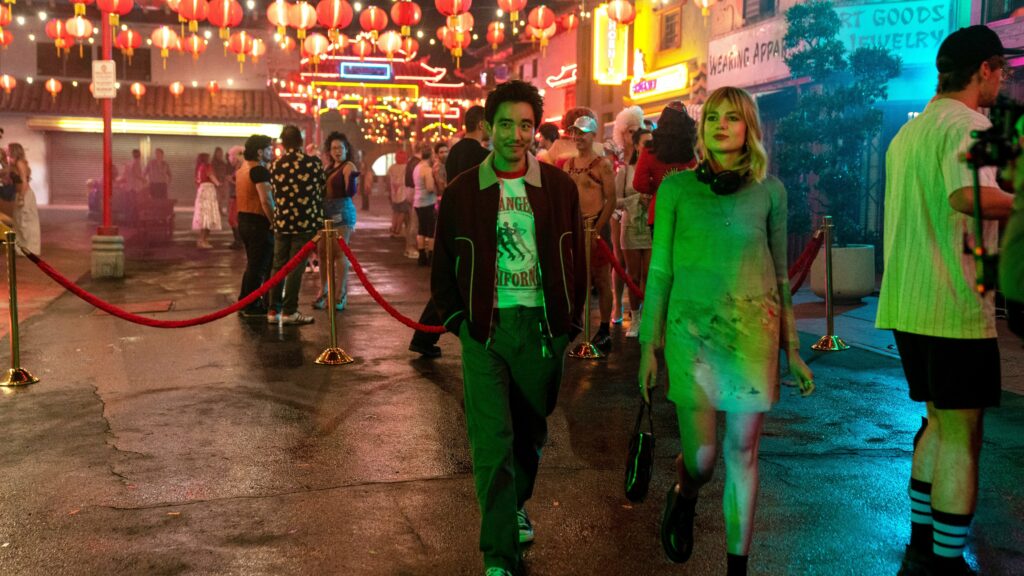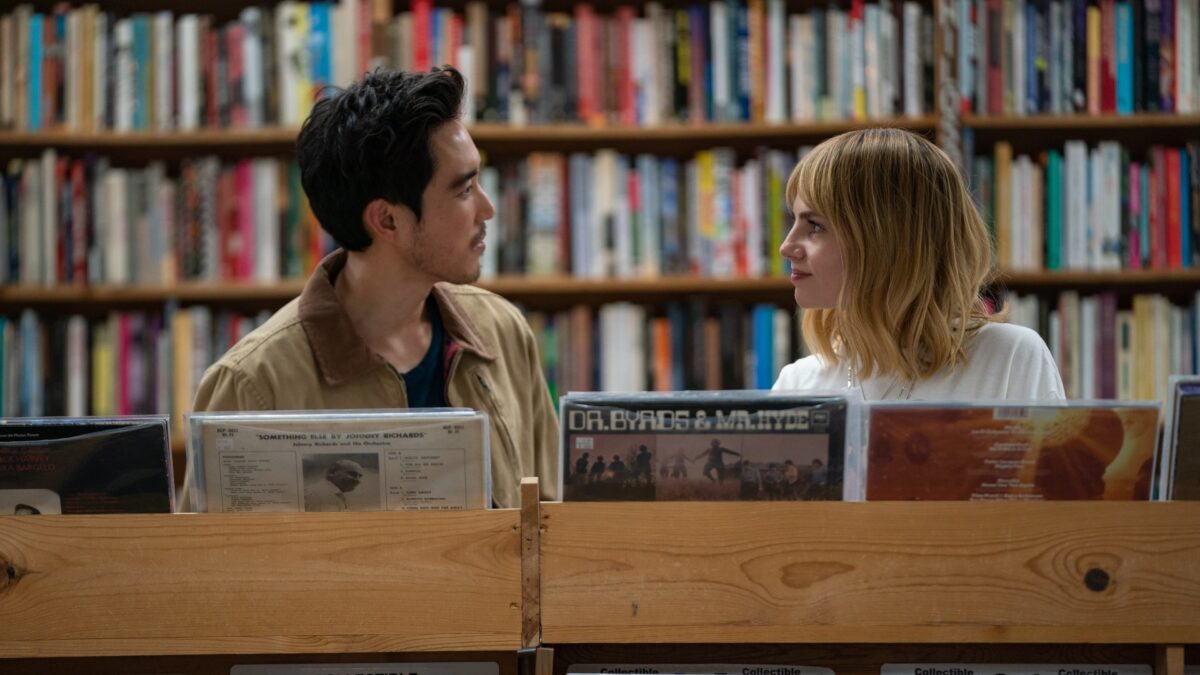Groundhog playlist
That The Greatest Hits is not excellent, not even especially good, is a travesty. It has a slam dunk premise, just tailor made for me: Music superfan and producer Harriet (Lucy Boynton) is mourning the death of her boyfriend Max (David Corenswet) two years ago in a car crash. But a head injury that Harriet received herself in the crash has given her an unusual condition: Whenever she hears a song that she listened to while in the company of Max during their relationship, she travels back in time to the moment she and Max heard the song, returning to the present when the song is finished playing.
This pitch toes the line of speculative fiction vs. metaphor perfectly, in much the same way that Groundhog Day is about depression, Eternal Sunshine is about the agony of a breakup, and The Truman Show is about… well, six different things, I guess.
Harriet’s obsession becomes finding the song that she and Max were listening to as they got into that car accident so that she can prevent the accident and bring him back to life. Meanwhile, she spends a lot of time with her gay best friend, Morris (Austin Crute), who hosts a bunch of drag raves. She also hits it off with David (Justin H. Min), whom she meets at a support group session, and who offers the first romantic salve to her suffering since Max died.

We eventually learn that she has experimented with just how much of the space-time continuum she can alter during her flashbacks: She can change her behavior during her visits to the past, but not that of those around her. For example, during a thrift store argument, she can’t convince Max not to buy an ugly chair he really bought; but she can do something to change the world that ripples forward to the present in small ways. Could pulling the steering wheel or stomping on the brakes at the moment of collision be enough to save Max’s life? Would she return to a present where he’s still around?
It’s a cool hook, but the problem is the execution. For one, it’s far too sloppy in defining the rules and physical reality (or lack thereof) of her time travel. It reads at first as a pure metaphoric memory hallucination, which kinda contradicts her stated goal of manipulating the past. By the time the movie gets around to explaining specifics about how Harriet can manipulate what she does in her trips to the past, but not other people, it’s too late in the runtime for it to feel like a proper system. (Also, I could be misremembering, but it seems to contradict some trips to the past we’ve seen where she accidentally wreaks havoc that would have downstream effects.)
And there’s another problem that’s just as big, which is the ending. I admire any ending that takes a swing, and I respect a film that left-turns into a self-contradiction and just runs with it (see: The ‘Burbs). But I think this movie does not really earn its bleak finale.

Spoilers ahoy, if you care: You’d expect the culmination of a film about the grief of losing a loved one to be the realization that pain gradually fades and heals, but it does not invalidate the meaning of that loss, or some minor variation therein. But in The Greatest Hits, Harriet solves the problem of her time travel (which is, again, a proxy for her grief) by eradicating the entirety of her relationship with Max from history by altering the moment she met him. She does this not accidentally, but intentionally, so that she can not feel sad about him or be forced to revisit moments with him anymore, and therefore move on and meet other boys like David. It is better to have never loved at all than it is to have loved and lost, I suppose.
It’s a deeply cynical and anti-humanistic ending, but I really don’t think the movie thinks that it is. At least it doesn’t act like it’s taking some nihilistic plunge. It treats the annihilation of a deep, affirming love as just a nifty little narrative idea to tie a bow on the story. It’s like if Eternal Sunshine embraced Joel and Clementine permanently forgetting each other as its grand finale. But you know what? At least it’s broken in a batshit way. I’ll at least be thinking about this movie longer than I would if it had a flat nothing of an ending.

I also need to call out the film’s soundtrack. As a film built entirely around music as a transporting mechanism, it demands a good playlist, and it got one. The soundtrack is filled with songs I mostly did not know but I immediately liked — exactly the kind of tunes I always hope music-heads like Harriet will play for me. Some of it is too snoozy — it is an indie drama, after all — but the music is still an overall high point for The Greatest Hits.
With its solid cast and pleasant bops, The Greatest Hits is at least a good hang, and the premise is fascinating enough that I’m certainly overrating this by about one Is It Good? rating point. If only it could have executed its ideas a little more clearly and systematically, this could have been a real treat for weirdos like me who live speculative, high-concept dramedies.
Is It Good?
Nearly Good (4/8)
Dan is the founder and head critic of The Goods. Follow Dan on Letterboxd. Join the Discord for updates and discussion.


3 replies on “The Greatest Hits (2024)”
Huh. The spoilers actually intrigue me a bit more than I’d anticipated, since, whatever else, that is a distinctive worldview this movie’s got going on. I mean, that’s some unique shit. On the other hand, I’m not sure I like the premise (there’s something real hokily twee about it) and the bleed between “metaphor” and “literal story” sounds less than expertly managed.
The advertisements made it look like it was even more mismanaged than that, though, a very literal, “should I keep my boyfriend from dying, or would that eradicate my new fling?” conundrum. CHOICES CHOICES.
Oh and the “movie this is like” I thought of first was definitely High Fidelity, which I would not assume would be improved with time travel.
“High Fidelity meets The Time Traveler’s Wife” is probably more apt than the comparisons I’ve brought in.
I would not suggest most people trust my tweedar. My tolerance for twee is pretty high. “Too twee” has rarely been a hammer I’ve swung down.